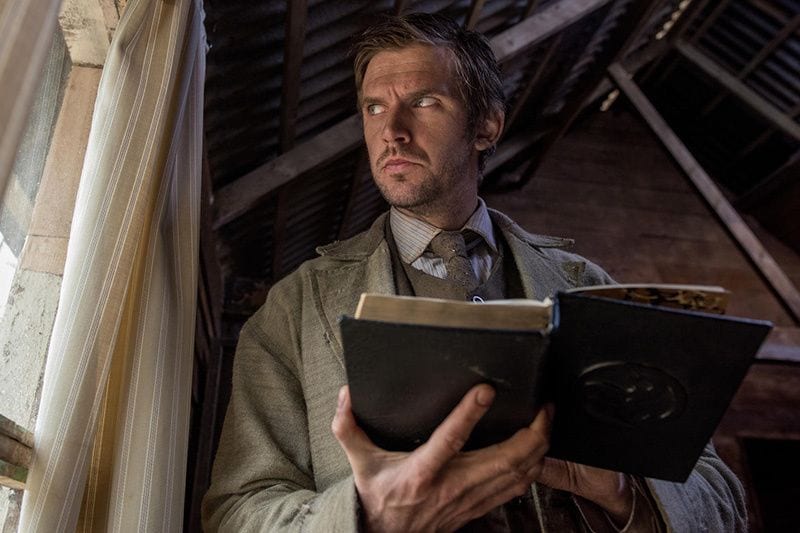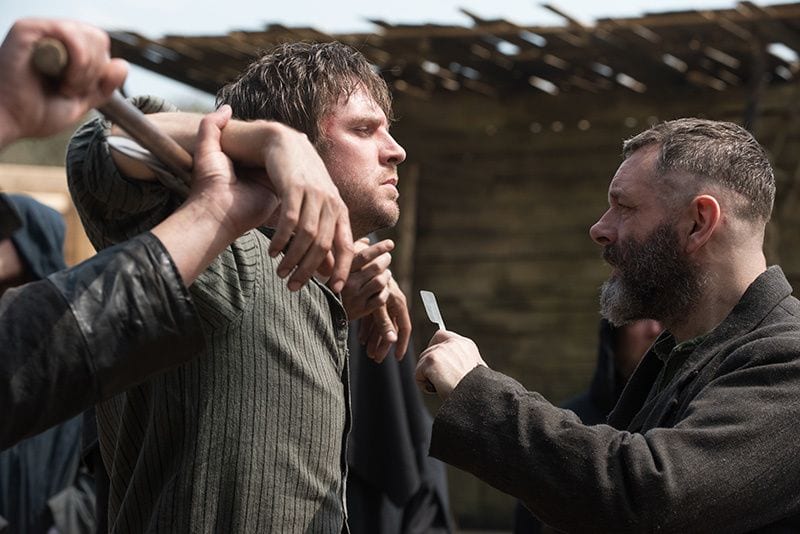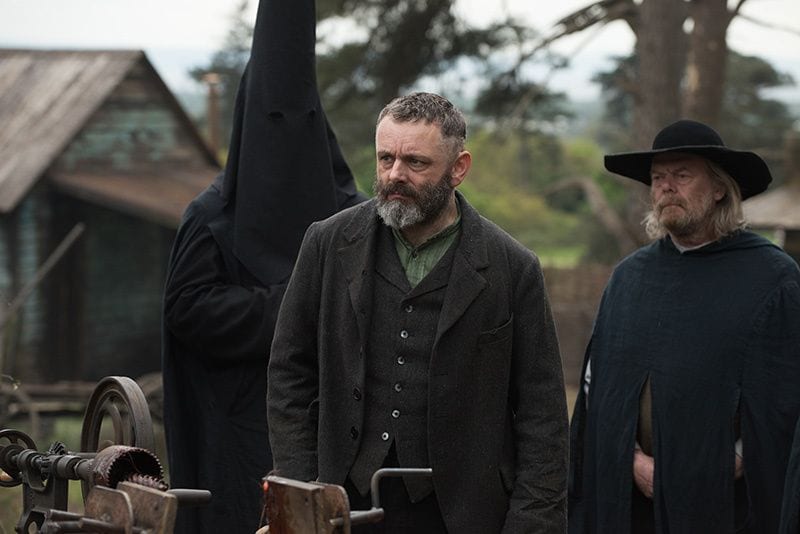Director Gareth Evans’ 1905 set occult horror Apostle (2018) sees Thomas Richardson (Dan Stevens) travel to an idyllic island, occupied by a cult under the leadership of the charismatic Prophet Malcolm (Michael Sheen). Infiltrating the community with the intention of rescuing his sibling who is being held for ransom by the cult’s leaders, he uncovers the secrets and a sinister evil that bonds the cult to the island.
Known for his martial arts action films
Merantau (2009), The Raid (2012) and The Raid 2 (2014), this is not the first venture into the horror genre for the Welsh born filmmaker. In 2013 he co-directed with Timo Tjahjanto the cult set story Safe Haven, a segment of the flawed horror anthology V/H/S/2 (2013), in which Evans and Tjahjanto’s story was the only noteworthy entry.
In conversation with PopMatters, Evans discusses the contradictory feelings he encounters during the filmmaking process, his intent towards reflection rather than offering a social statement, and how the anxiety of the modern world inevitably bleeds into a work of fiction.
When I spoke with Jeremiah Zagar, director of We the Animals (2018), he remarked “Each film is a love affair. It’s like falling in love for the first time and then when you look back on the film, when you see the images, the moments that took place over the course of the movie, it reminds you of that love.” Do you think we can talk about film in this way, or is it indicative of an overly-romanticised notion we have developed towards cinema?
…[I]t’s one of those things where I feel like filmmaking to me is this oddly narcissistic relationship; I’m not sure there’s romance in that [laughs]. There’s nothing else that I could possibly want to do with my life; I just wouldn’t be good at anything else. And it’s a weird thing because it’s like you spend your time writing and then you can’t wait to be on set making the film. Then when you are on set making the film because of the process of it all where it’s a stressful environment, and when you are shooting a scene you are never going to get another opportunity to shoot that scene. So it’s almost like the pressure is so high that you’ve got your shots and your coverage right, you told the story and that particular scene right, that when you are into that halfway point of the shoot, your brain starts telling you: I can’t wait to be in post-production. You get to post-production and then about ten to 12 weeks into it you start thinking: You know, I can’t wait to sit down and be able to write the next thing. It’s this cyclical thing where whatever process you are doing, you can’t wait for the next step, and then when you’re doing that step, you can’t wait for the next one.
It’s stressful, we all complain about bits and pieces of it, but there’s nothing else I would rather do. And to be honest when it comes to the films I have had the fortune to be able to make so far, they’ve all been films that I’ve felt passionately about. So I guess in a weird way, it’s me coming back to the idea of that romanticism. Yeah, you do fall in live with a film when you first start making it, and you kind of have to love it more than anyone else, because if you can’t feel passionately about it, then you are not the right person to make it. So I think there is some truth to that, but there’s a little bit of narcissism too [laughs].
What was the seed of the idea for Apostle and to speak about theme, are you attentive to specific themes from the outset, or do the thematic interests of the film gradually emerge?
I think it was something that gradually emerged if I’m honest about it. Basically, when it came to Apostle there were a number of factors that led me to make it. One was I moved back to the UK, and initially I moved back because I was going to work on a new project. It was going to be an action film for a studio in the US, and for various reasons, mostly down to scheduling conflicts we never made the film. So I found myself two years after making The Raid 2 (2014) thinking: Well, what am I going to do now? What am I going to make?
Two years is a long time to not be making a film, so I knew I wanted to do something, and I got in touch with the guys from XYZ Films. They’ve been great partners with me… I said I wanted to make a horror film, to do something different. I’ve made three martial arts films back to back in Indonesia, and so I wanted to tackle a different genre.
When I was in Indonesia I had made a short horror film called Safe Haven for the V/H/S/2 anthology with Timo, a friend of mine. When we did that it was a real fun experience, it was a taste of what it’s like to make something in the horror genre. What it told me was there were lots of striking similarities between the DNA of making an action and a horror film, and struck by that, I wanted to flex that muscle again. So when you talk about initial impulse, that was the starting point for it.
I had a short film idea that gave me the basic concept of a sibling searching for another sibling. There was also an envelope with a rose petal in it, some soil from the earth, and those were the only things that carried over from the short film into what Apostle became. It was all of those little tiny seeds of ideas and impulses that pushed me into this mode of wanting to make something in this genre.
I then gradually began working and developing the idea with Aram Tertzakian for XYZ Films, I just started sending him images, ideas, references and things that spoke to me, that made me interested, and which told us that it should be period set in 1905. Looking at articles about the Peking Boxer Rebellion led us to start evoking these themes of religion, politics and atheism, and the mythology of what this island could be. So it was all just stepping stones and adding layer by layer, piece by piece of what would eventually become the world of the story.
To paraphrase a quote from a friend many years ago: God uses good men; evil men use God. This relates to Apostle in the way that the antagonists of the drama use God, scripture and religion for such nefarious means.
…[T]hat’s beautiful. Yes, the subtext of the film was more about the idea of how man will abuse things, but I didn’t want it to be a critique of religion so to speak. I have family and friends who are religious, they don’t wear it on their sleeves as part of their souls, but I see the beauty of what that religion does for them.
I guess the subtext of this film is more focused on that idea of man’s ability to abuse and corrupt religion, and to twist people’s faith in order to further a political gain. That’s not anything new, it’s prevalent at the moment in terms of global politics, and it has been around for centuries. But it was certainly a subtext that I wanted to feel would be part of the larger storytelling of this film.
How important is the subtext of a film in helping it to endure beyond the immediacy of the contemporary?
I don’t think it’s a conscious decision for it to be something that endures. I’ve always loved the horror genre and it just happens that a lot of my favourite horror films have had those kinds of subtexts and have been reflective of a period of time. But that’s not what necessarily makes them endure; it’s more the craft of the storytelling. I don’t think it’s purely the subtext alone that can endure, whether an audience will make a film last for all ages. If that was the only intent behind it, that would not be the right reasons for doing it…
For me it was always a case of I didn’t want to make a social statement, it was more a reflection of what was going on at the time I was writing the story. It was the ritualistic side of things, looking at newspapers and seeing headline pages [of] all sorts of barbaric acts by ISIS, who were doing these very public executions, orchestrated to such a degree that it just felt unreal, barbaric and painful. So that was something that we were meant to be able to see and consume, and to not be okay with it.
How can we process that kind of violence; how can we process that kind of horror in real life? In terms of what we were talking about in regarding subtext, it,s more reflective as opposed to being a statement, so to speak.
I agree that because film is on one level about aesthetic and emotion, it can’t always be about the intellectual. Rather it has to combine the three through the craft of how a story is told. Picking up on your point about being reflective, there’s the supposition that genre cinema chronicles the social angsts and preoccupations across the decades, that frames the reflective nature of genre.
Yeah one-hundred percent. If you look at the history of the horror genre, The Texas Chainsaw Massacre (1974), I know Tobe Hooper, God rest his soul had talked a lot about how his influence came from the nightmare and the horrors of seeing news reels from Vietnam. So it’s all a process of dealing with our consumption of what we are learning about the world as we grow up, as we become adults, and as we start to see the horrors of humanity in a way.
And to be honest there’s something of a shift now in terms of just how much information we are given on a daily basis, of what goes on in the far reaches of this world. It has changed a lot in the last five to ten years, this information, this condensed speed of news items of acts of violence… And I got kind of sick and tired of seeing that.
I used to use Twitter and I had to get off it because every morning it was like I’d wake up, and the first thing I’d do is reach for my phone, click on it and check the timeline. It would just be this condensed set of tweets and feeds of whoever I was following at the time – some atrocity in some place, and it would be a news item, it would be an outraged opinion on something, and it’s not healthy; it’s not a good thing to do. I had to get off it because I was sick of that being the first ten minutes of my day, everyday; of just seeing that amount of grief and violence all condensed into a ten-minute scroll on a phone.
I’m a parent raising two kids now and I’m concerned about what the future is going to be like for them. You read the news and you just see it, it’s a constant influx of negative energy and information. So I guess some of that anxiety does spill over into works of fiction like what I’ve done with this movie.
Filmmaker Christoph Behl remarked to me: “You are evolving, and after the film, you are not the same person as you were before.” Do you perceive there to be a transformative aspect to the creative process, and should the experience of watching a film offer the audience a transformative experience?
Yes [laughs], that’s the short answer. I think everything that we do creatively, whether it’s intentional or not, has some form of catharsis. Whether that’s permanent or just temporary… It’s probably just temporary to be honest, almost like a release valve for a while. Films do have the power to transform and I have seen films that have effected me very deeply, whether they have been very raw emotional films or not. But films also have the ability to provide moments of escapism as well, and so there’s something unique and manipulative about it as a creative art. In the same way music can do that for me, I might listen to a song and it could be a specific chord or a specific note, or a lyric that no matter how many times I’ve heard it, always strikes an emotional reaction in me. I think that’s true across all art forms, but cinema happens to be the medium through which I’m fortunate and lucky enough to be working in. So yeah, I would aspire to reach that point at some time in my career, but I’ve got a lot to learn before I get there.
Following its World Premiere at Fantastic Fest 2018, Apostle is now streaming on Netflix.





